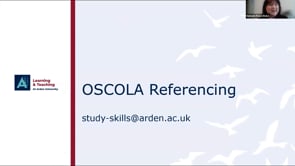-
Subject Guides
- Computing
- Criminal Justice
- Design and Creativity
- Digital Education in Practice
- Digital Finance
- Digital Marketing and Sales
- Engineering
- Health and Care Management
- Human Resource Management
- Institute of Foundation Studies
- Investigation, Security and Defence
- Law
- Leadership and Management
- Project Management
- Psychology
- Supply Chain Management and Logistics
- Tourism and Hospitality
- A-Z Databases
- Browse Journals
- Academic Skills
- English Language
- Other
What is this topic about?
Referencing is an important pragmatic skill that you will develop throughout your studies. Whether your course requires you to use the Harvard, APA, or OSCOLA style, these resources can help you understand and apply the principles of citation. Most plagiarism isn’t the result of malicious malpractice – rather, it occurs accidentally, and is usually caused by poor or incomplete referencing. However, accidental plagiarism is still plagiarism, and you should make use of these resources to avoid this.
Referencing Guides

OSCOLA
Workshops
Using AI for Academic Purposes
Generative AI tools have the potential to make higher education more accessible to many students. However, if students use them in ways that are unethical, they may find themselves committing academic misconduct. This workshop will take you through how AI tools can be used in ethical ways for academic work, as well as ‘what not to do’. We will also clarify how accessibility tools can be used and referenced in assignments.
Understanding Plagiarism
The Understanding Plagiarism workshop starts a discussion about academic integrity and good academic practice. It will introduce you to some of the reasons why referencing will be such an important part of your academic journey and how best to maintain academic integrity so that you can avoid plagiarism. Understanding Plagiarism will introduce you to the basics of referencing, but for a more in-depth look at referencing, please also attend one of the specific referencing sessions.
Harvard Referencing
The Harvard referencing workshop gives an overview of some of the most common referencing conventions seen in Harvard referencing. Referencing correctly is key to good academic practice. This workshop focuses on Arden University (AU) Harvard, in-text citations and how to construct some of the most common types of bibliographic citations. It will also highlight how to best make use of the referencing guides that are available and answer any referencing questions that you might be having difficulty with.
APA Referencing
The APA referencing workshop gives an overview of some of the most common referencing conventions seen in APA referencing. Referencing correctly is key to good academic practice. This workshop focuses on APA, in-text citations and how to construct some of the most common types of bibliographic citations. It will also highlight how to best make use of the referencing guides that are available and answer any referencing questions that you might be having difficulty with.


